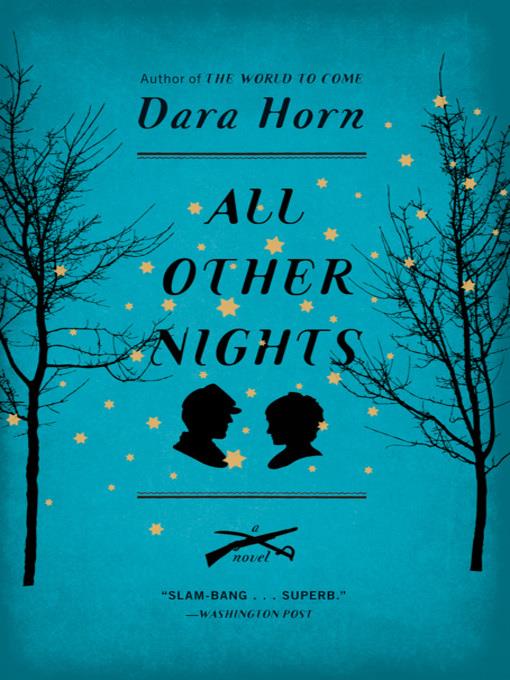
All Other Nights
A Novel
- اطلاعات
- نقد و بررسی
- دیدگاه کاربران
نقد و بررسی

Starred review from February 2, 2009
A Civil War spy page-turner meets an exploration of race and religion in 19th-century America in Horn's enthralling latest. Jacob Rappaport, the 19-year-old scion of a wealthy Jewish import-export family, flees home and enlists in the Union army to avoid an arranged marriage. When his superiors discover his unique connections, he is sent on espionage missions that reveal an American Jewish population divided by the Mason-Dixon line, but united by business, religious and family ties. After being sent to assassinate his uncle in New Orleans on Passover, Jacob's next assignment proves even more daunting: marry the feisty Confederate spy Eugenia Levy. What starts out as a dangerous game for both Jacob and Eugenia ends up being a genuine romance, fraught with the potential for peril, betrayal, tragedy and redemption. Horn propels the love story at a thriller's pace; the mix of love and loyalty played out in a divided America is sublime.

March 1, 2009
Horn (The World to Come, 2006, etc.) details the adventures of a young Jewish spy for the Union.
In the hours before Passover 1862, 19-year-old Jacob Rappaport emerges from a smuggler's barrel onto the New Orleans waterfront. The son of a wealthy New York merchant, he joined the Union Army to avoid an arranged marriage and has been sent South to kill his Uncle Harry, suspected (rightly) of planning to assassinate Lincoln. Jacob slips poison into his uncle's seder wine, and Harry expires spectacularly, vomiting black bile onto the silver trays. Regrettably, this is the most dramatic moment in the novel. Jacob's next assignment is to infiltrate a Virginia household and marry beautiful Rebel spy Eugenia Levy. Assisted by her three sisters, she's passing on military secrets blabbed by a Union officer too pompous to realize"that ladies also have brains." Horn's Dan Brown–like fascination with codes and passwords is unlikely to be shared by readers, nor is the romance terribly compelling. Jacob falls for Eugenia and succeeds in marrying her, but his ambivalent vacillations between shame and bravado make him a weak hero. Eventually the sisters are arrested and Eugenia is reported dead: more shame for Jacob, who has now betrayed his wife as well as killed his uncle. His mission is over, but the novel is only half finished. Jacob returns to the South as a regular soldier—primarily, one suspects, so Horn can work Grant's order to expel Jews into the plot. Crippled and partially blinded in an accident, Jacob volunteers for one last mission, which involves gaining the trust of Judah Benjamin, the Jewish brains behind the Confederacy in Richmond. Two big questions remain: Is Eugenia still alive? Will Jacob be a fool for love? Make that three: Does anyone care?
Turgid and meandering.
(COPYRIGHT (2009) KIRKUS REVIEWS/NIELSEN BUSINESS MEDIA, INC. ALL RIGHTS RESERVED.)

April 1, 2009
Sometimes it only takes one night to change lives forever, often in ways that people only appreciate when reflecting from the distance of time. Jacob Rappaport, a Jewish soldier in the Union army, will forever ponder the age-old question asked around the Seder table: How is tonight different from all other nights? On Passover 1862, Jacob is ordered by a Union commander to kill his uncle (who is plotting to assassinate President Lincoln), and this particular evening changes forever his view of religious tradition, love, and integrity. Horn, the award-winning author of "The World To Come", has written a stunning historical novel that will challenge readers' preconceptions as they learn about the role of Jewish Americans during the Civil War. Her tale of Confederate Hebrew spies skillfully puts a new spin on a time period that has been researched and written about extensively. This timely book, coming on Lincoln's bicentennial year, is recommended for all libraries. [See Prepub Alert, "LJ" 12/08.]Marike Zemke, Commerce Twsp. Community Lib., MI
Copyright 2009 Library Journal, LLC Used with permission.

Starred review from April 15, 2009
How is this night different from all other nights? Jacob Rappaport, a Jewish soldier in the Union army during the Civil War, has his own, very different answer to this ritual question, traditionally asked at a Passover seder. In March 1861, Jacob is spending Passover at the home of relatives in New Orleans, but he is there with a special assignment: kill his uncle, a loyal southerner, who is planning to assassinate President Lincoln. Horn, author of In the Image (2002) and The World to Come (2006), follows this stunning set-piece with a complex, multilayered, and thoroughly involvinghistorical novel. Rappaports second assignment as a Union spy is every bit as troubling as his first: to woo and then marry the daughter of a Jewish businessman in Virginia with whom he had dealings before the war. It is no surprise, of course, that Rappaport falls deeply in love with the womanpurported to be a Confederate spyhe was sent to entrap, but it is certainly surprising to watch how Horn develops this premise. Yes, she tells a deeply moving love story, but she grounds it both in vivid details of life on the imperiled Southern home front during the Civil War and in the broader, universal conflict between contradictory loyalties: to loved ones, to faith, to duty, to ideology. The various charactersincluding the real-life figure of Judah Benjamin, secretary of state to Jefferson Davis and the first Jewish cabinet member in American historyagonize over these conflicts, resolving them in different ways but never overcoming the pain they leave in their wake. Horn both unearths a fascinating, relatively unexplored aspect of American historythe role of Jewish Americans in the Civil Warand delivers a novel rich in human emotion and ambiguity. A triumph.(Reprinted with permission of Booklist, copyright 2009, American Library Association.)




دیدگاه کاربران